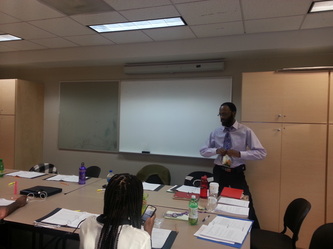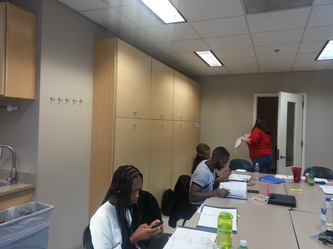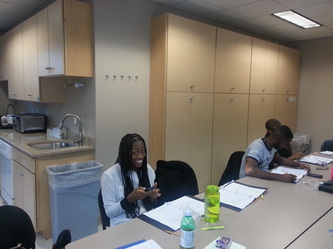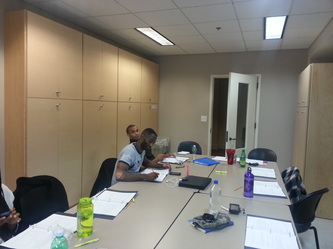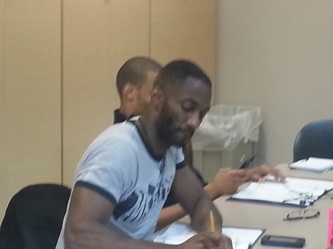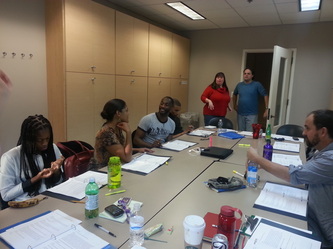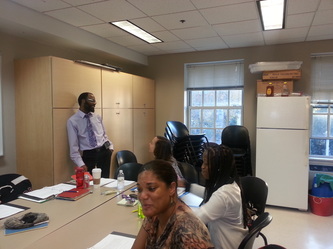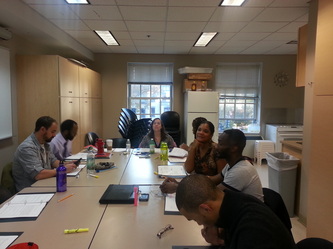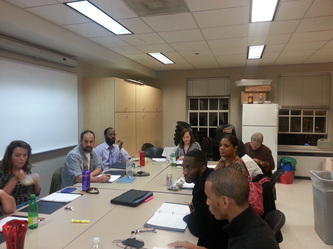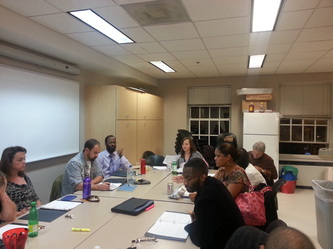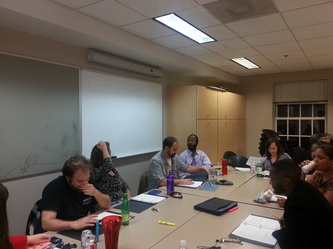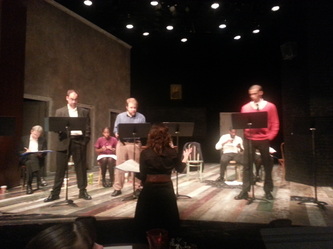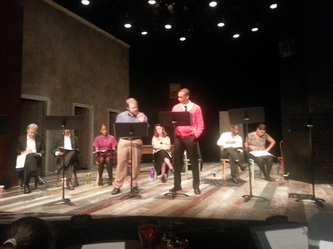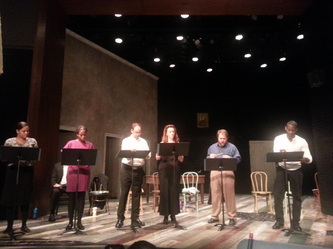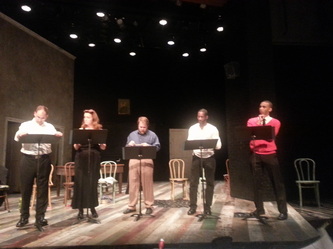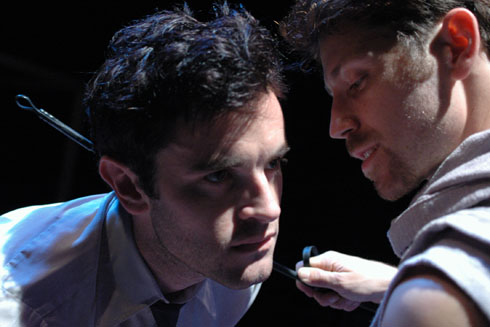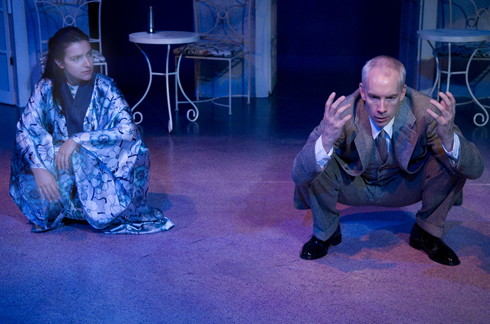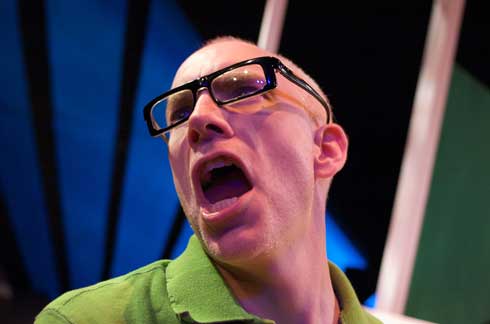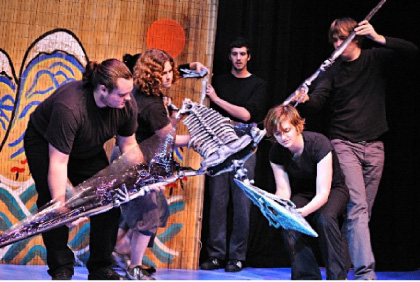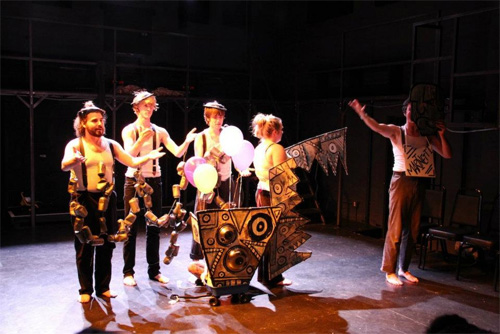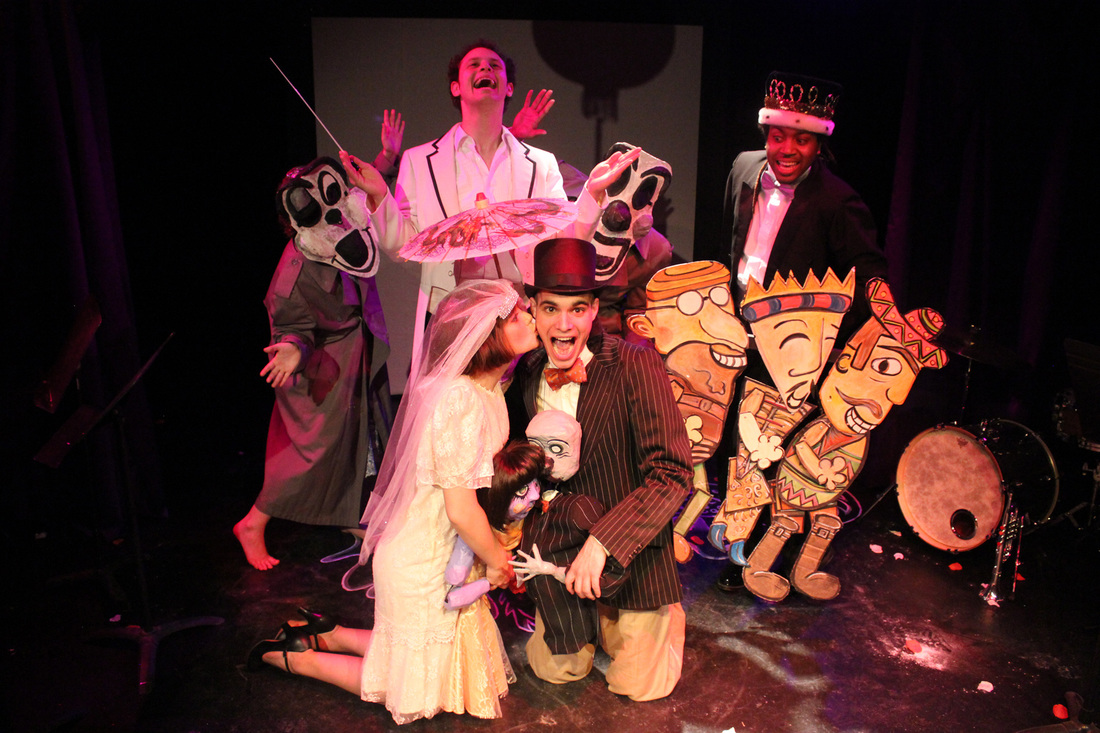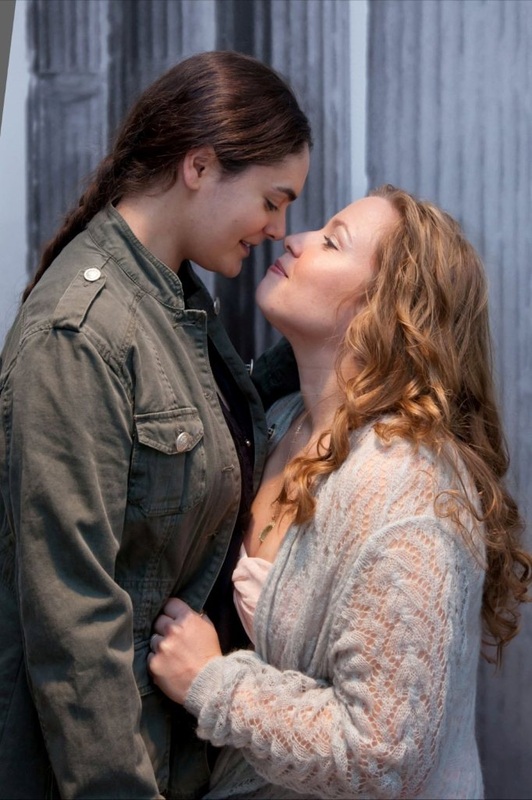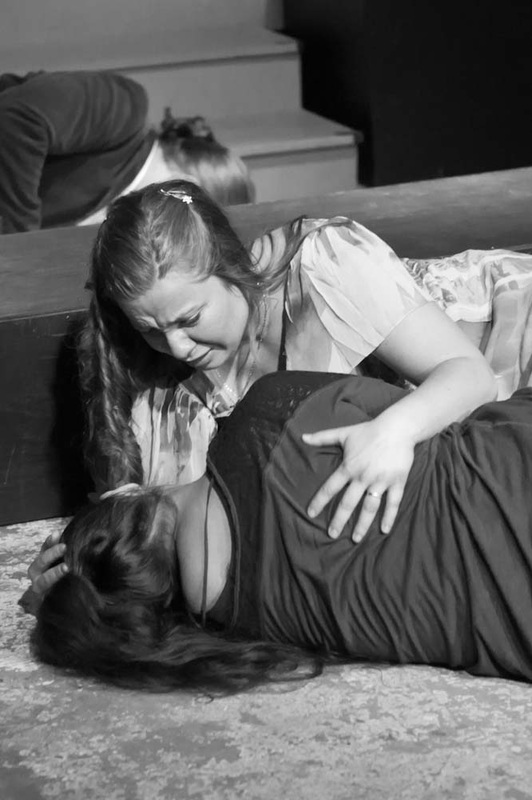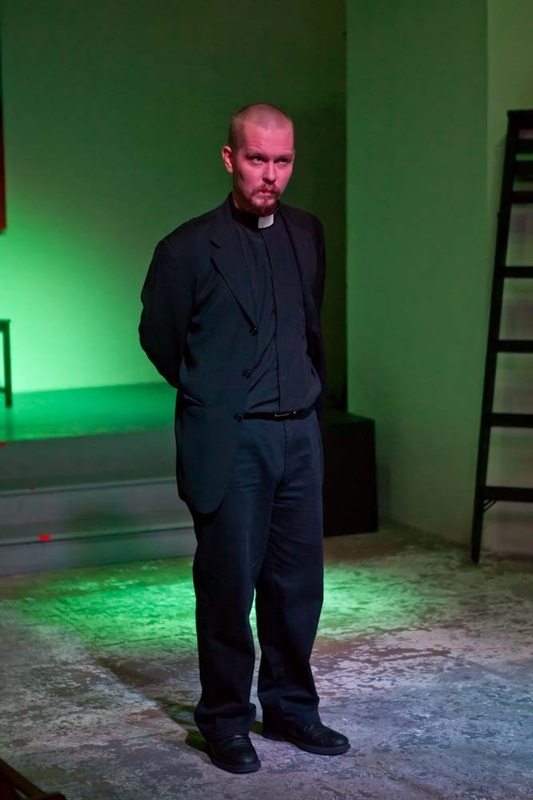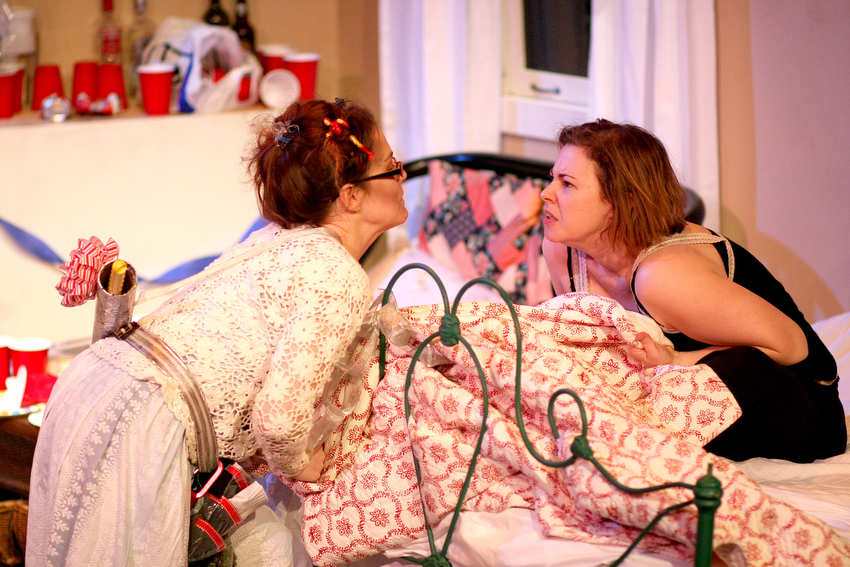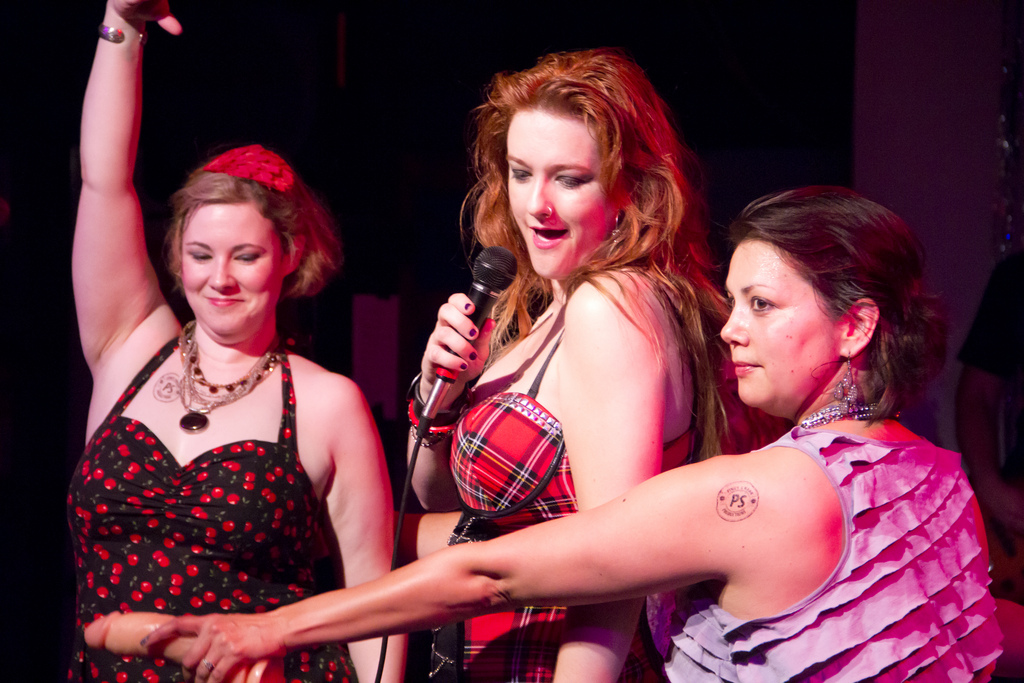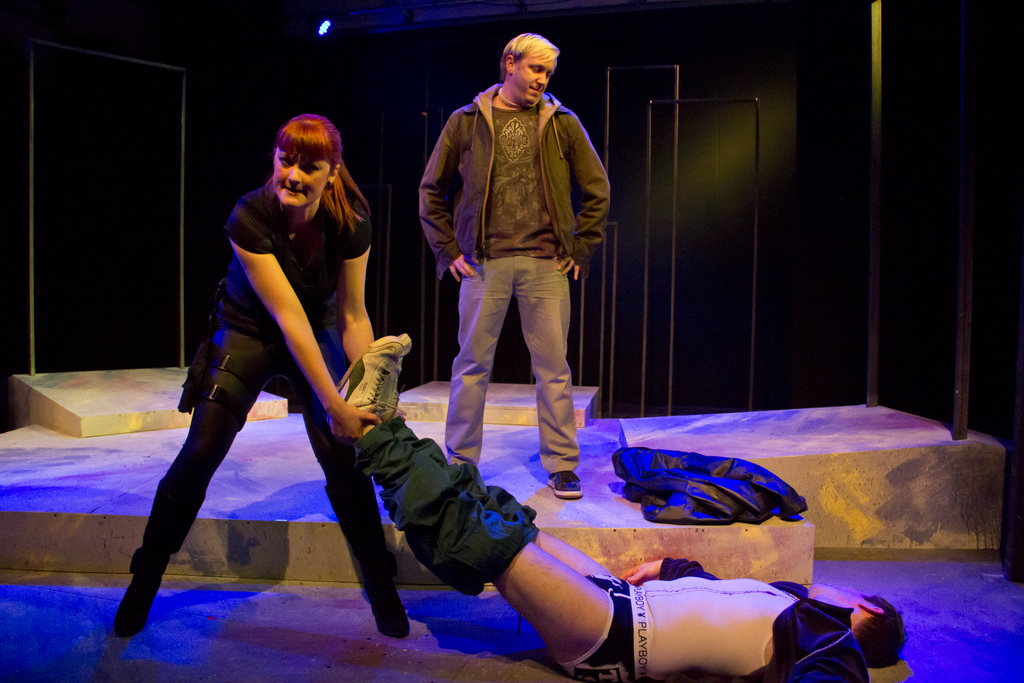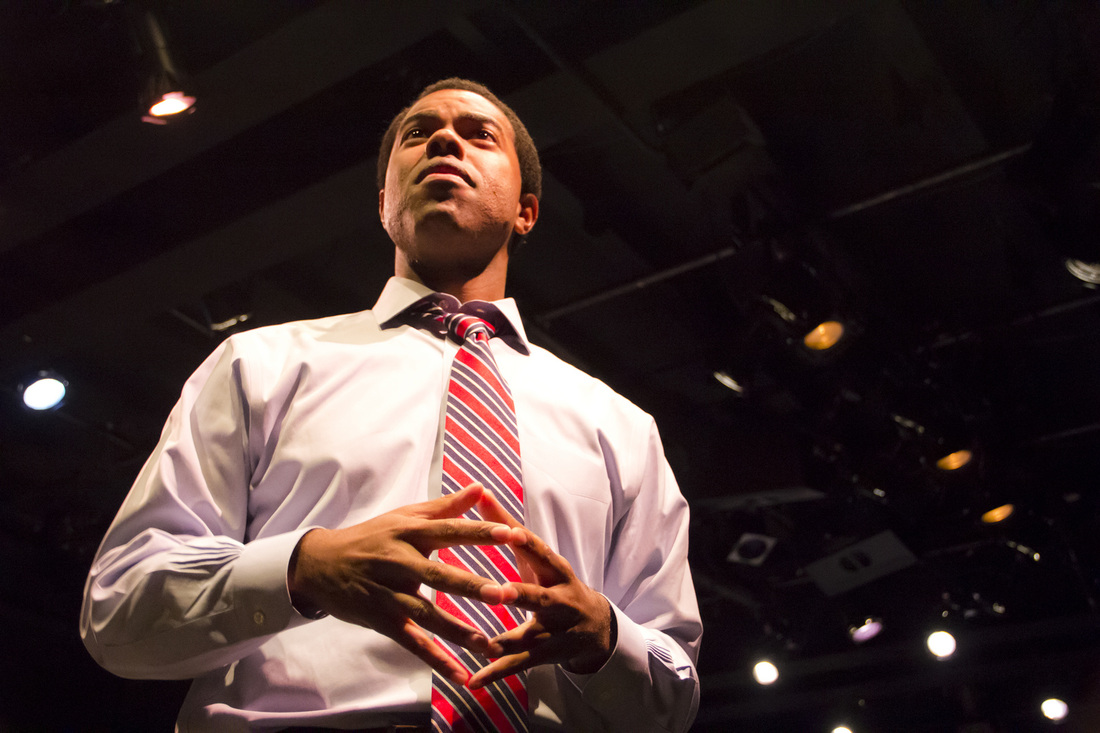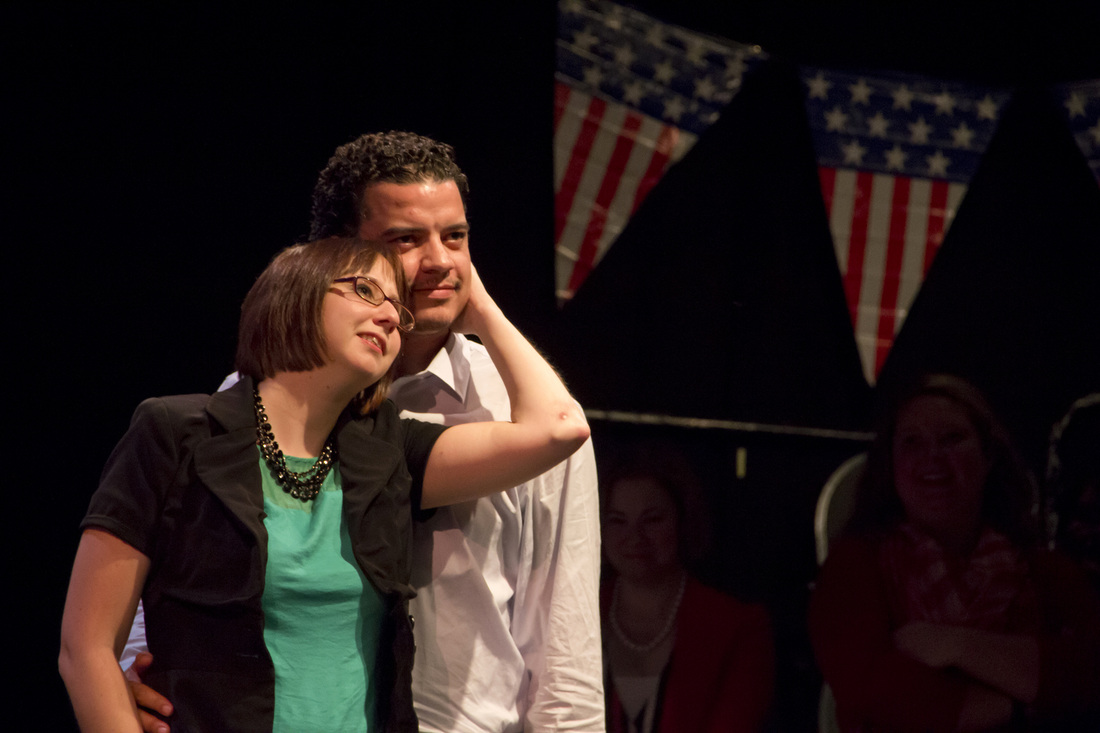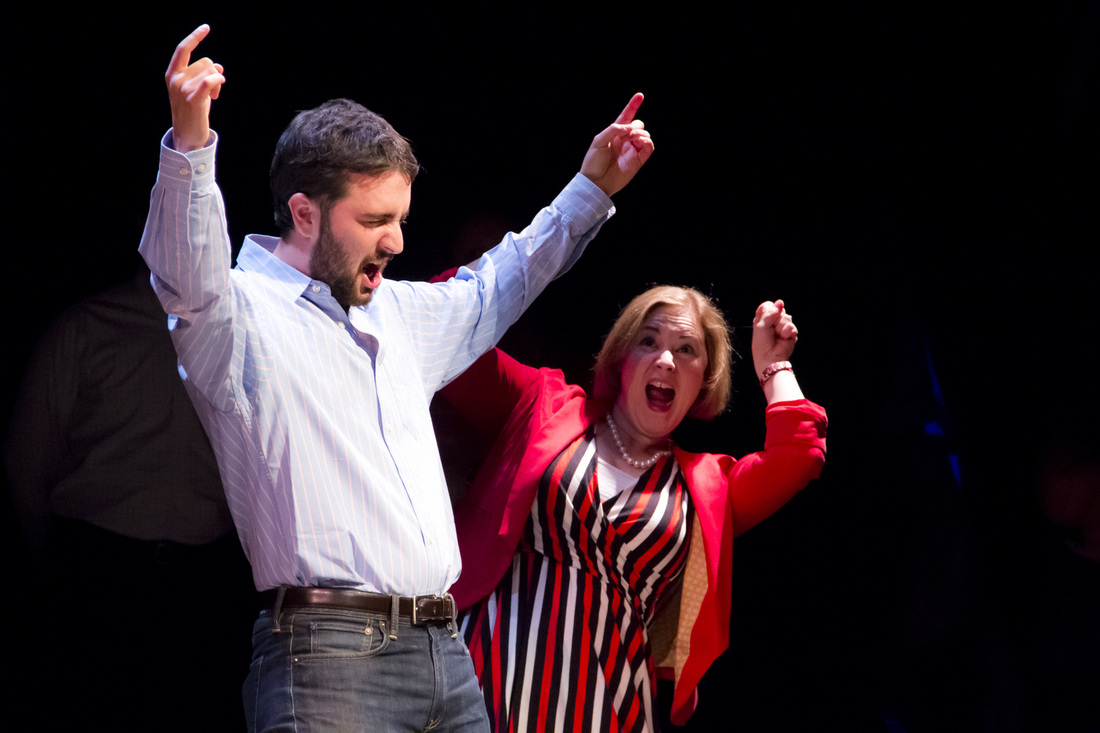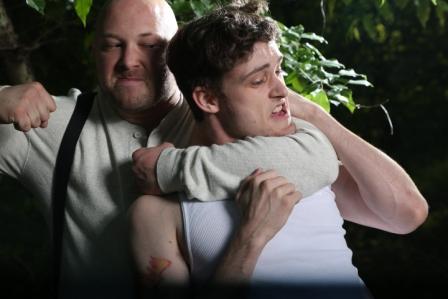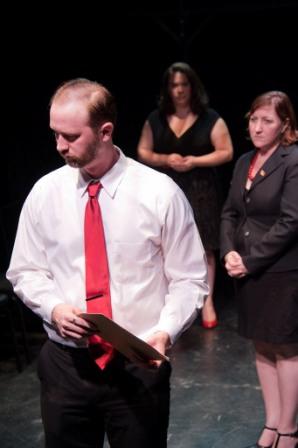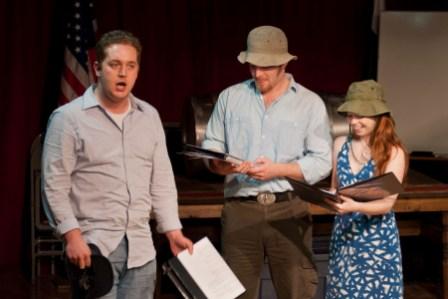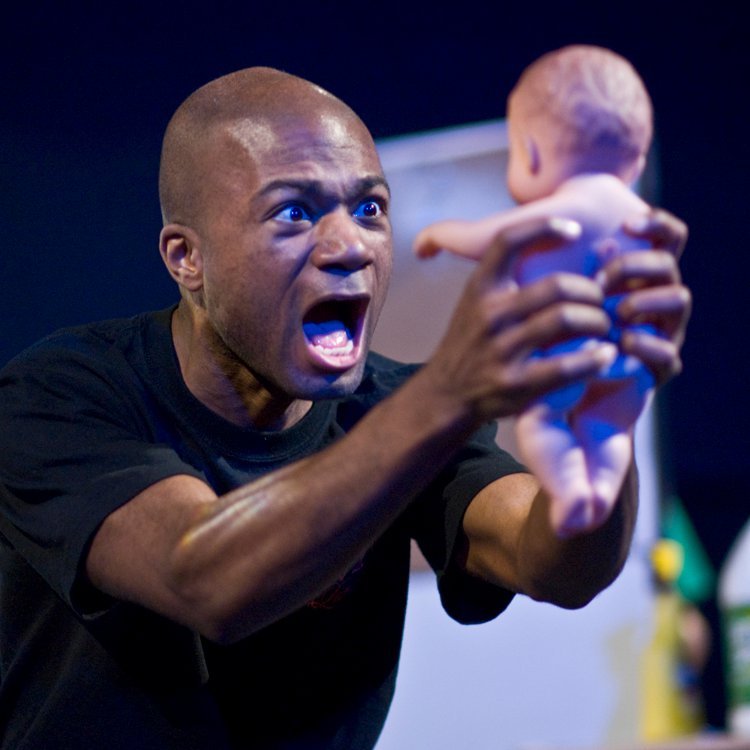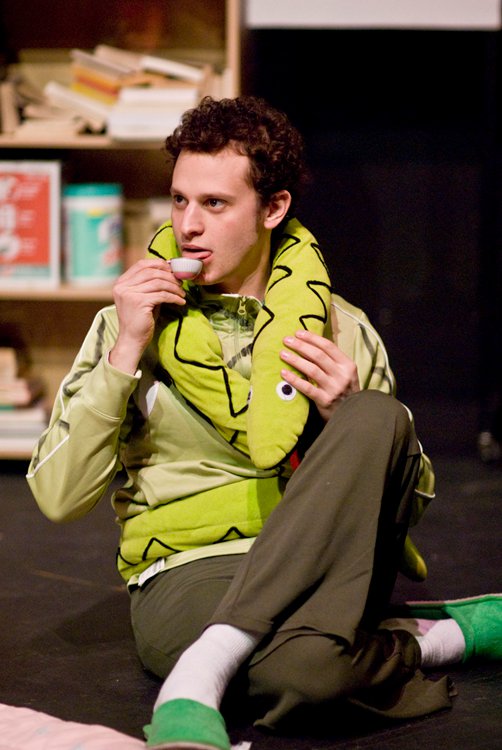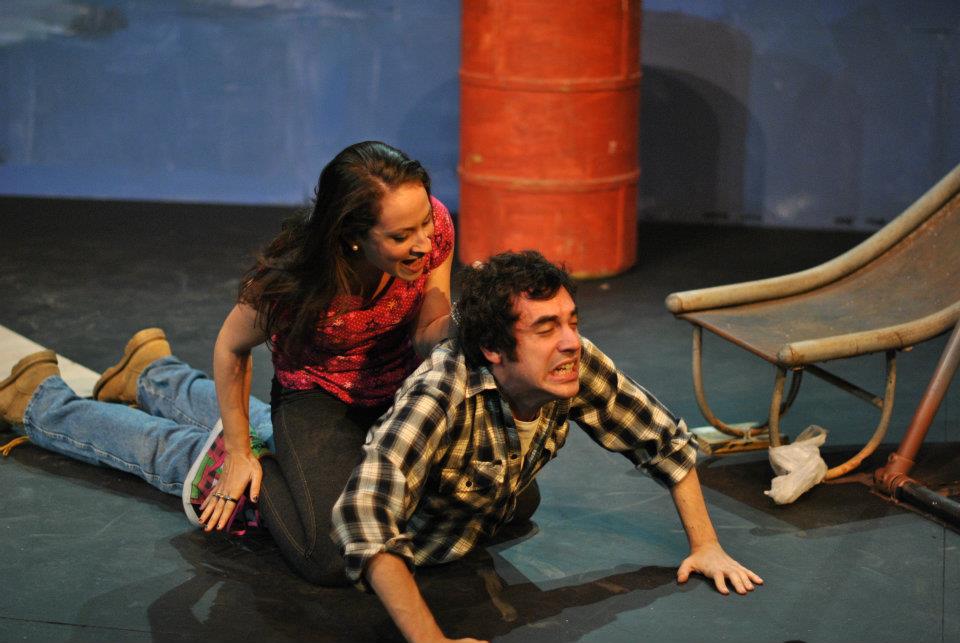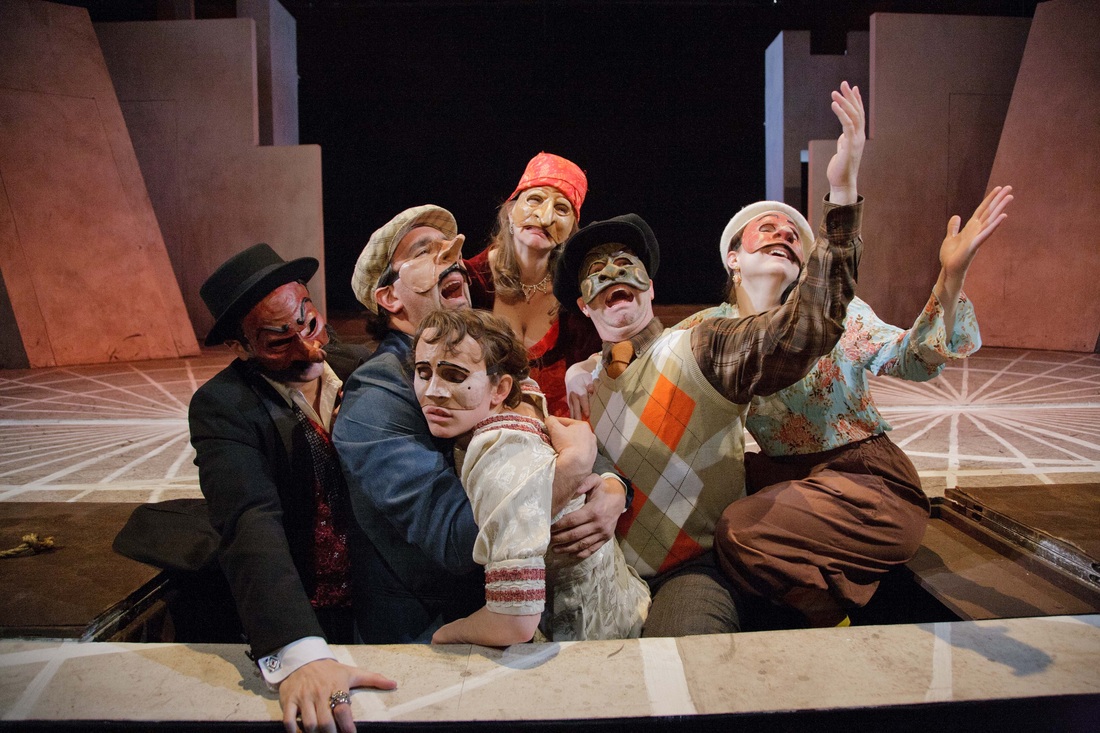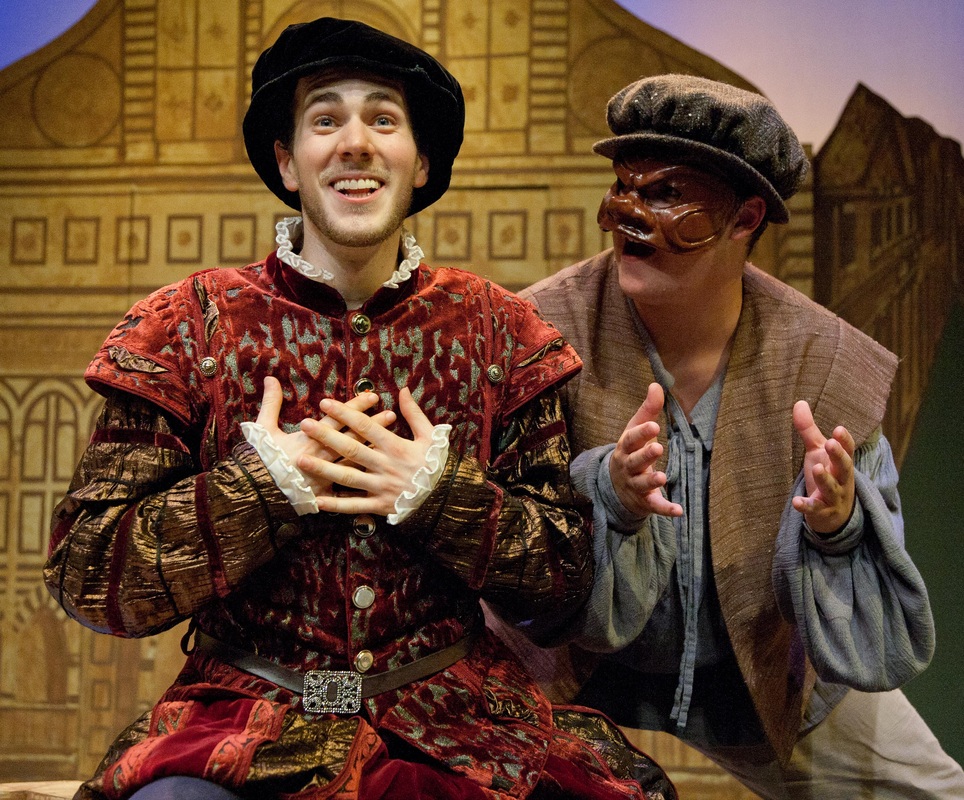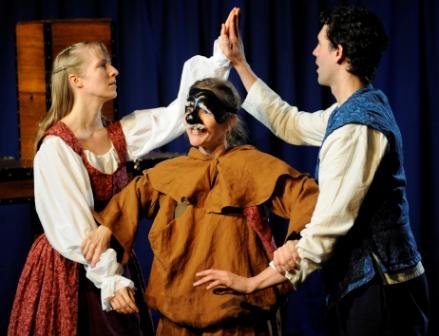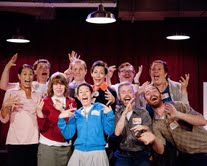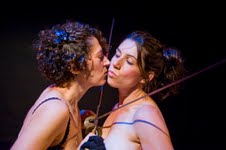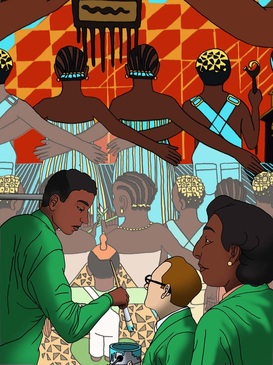 This past Monday and Tuesday, Theater J hosted a fruitful and productive new play development workshop of The Hampton Years. We had ten glorious hours to read, investigate and ponder the script. The "we" being director, Shirley Serotsky; dramaturg, Otis Ramsey-Zoe and cast, Edward Christian, Crashonda Edwards, Lolita-Marie, Julian Elijah Martinez, Sasha Olinick, Colin Smith, Emily Townley and David Lamont Wilson. Suffice it say, I am blessed with a brilliant, generous, and thoughtful artistic team and cast. You can read more about my director and dramaturg here, and my cast here. On Wednesday and Thursday, I took the riches given to me in our time together and worked on rewrites. It isn't easy work, but I really enjoy the rewriting process. I love asking the great "what if ..." and seeing the impact such a question can make on the lives and desires of the characters and on the overall dynamics of the play. With each new draft, the characters grow richer and more complex and the plot becomes increasingly clearer and more cohesive. It's interesting to see how the play takes shape. As one character comes center and more into focus, sometimes complete scenes are deleted and another character's storyline may fade into the background. This can be challenging to balance. It's a real luxury and privilege to have this time to write, question, explore and work through it. Our work culminated in a public staged reading on Friday followed by a post show discussion. The reading went extremely well. In truth, it's during the reading, when I'm able to observe the verbal and nonverbal response of audience, that I learn so much about what works and doesn't work about the script. The post show discussion offered the audience an opportunity to reflect critically on all they just experience. Post show discussions are a beast. I've led a great many of them as a dramaturg and participated in quite a number as a playwright. No matter what your role, it is challenging to guide, elicit, and negotiate the questions, opinions and suggestions of a newly formed community. I come from the Liz Lerman school of the Critical Response Process. I've shifted her suggested structure to suit my own style and the needs of the playwrights, but always I ask the audience to hold their prescriptive feedback, their well-intentioned and often insightful "you should do this" and "you should do that." I mean, they may want to write their own play one day, so they should really keep all of those delicious gems to themselves, right?! Also, I frame my questions to the audience in this way:
In doing so, I learn three valuable points of audience feedback:
When all is said and done, post show discussions require practice, preparation and patience along with sophistication, finesse, a healthy dose of objectivity and a thick armor of skin. My advice: don't be wooed by the love or wilted by the hate. Focus only on what's productive, what will move the script forward and never lose sight of the heartbeat of your play. At this point in new play development process, I eagerly await the notes from my brilliant creative team and look forward to digging into more rewrites. At the same time, I'm leaving the world of The Hampton Years to work on my new play, Our Man Beverly Snow, ahead of its upcoming reading on Sunday, December 9th. Also, I'm working on two 10-minutes plays, one for Round House Theatre's Heyday Players and the other to be announced tomorrow! For now, please enjoy these pictures of The Hampton Years team from our time together this week.
2 Comments
Ahead of the 44 Plays for 44 Presidents event on Monday, October 29th, I had a chance to connect with Kathleen Akerley, Artistic Director of Longacre Lea Theatre. Here's our conversation:
Jacqueline Lawton: How did your company form and how long have you been presenting work in D.C.? Kathleen Akerley: In 1998 I formed the company as a sole proprietorship just in order to rent the Arena Stage Old Vat Room and direct a production of Macbeth – I thought it would be a one-time thing and then I would move to another city and build an acting career (my degree is in acting). Obviously that’s not how it went down . . . JL: What impact do you hope to make in the D.C. theatre community? KA: I have no particular hopes or agenda with respect to any impact I may have. JL: Is political theatre important to you? KA: Not as such. JL: Why did you decide to participate in 44 Plays for 44 Presidents? KA: I think the three dog&pony conspirators are bad ass. JL: Which president are you featuring? What’s his political affiliation and campaign slogan? KA: Benjamin Harrison - Republican; ‘Rejuvenated Republicanism.’ JL: What’s something interesting we should know about him? KA: His first wife was dying during his reelection bid and he spent more time with her than on his campaign (and lost). JL: Did he support the arts while in office? If so, how? KA: Not notably, as far as I can tell. JL: If he was running for office this year, would you vote for him? Why or why not? KA: I’d probably go all weepy about the wife thing and give him a sympathy vote for putting spousal loyalty over political victory. JL: In addition to 44 Plays for 44 Presidents, what’s next for your company? KA: Our 2013 summer show! TBA: www.longacrelea.org Ahead of the 44 Plays for 44 Presidents event on Monday, October 29th, I had a chance to connect with Patricia Kalil, Co. Artistic Director of Pointless Theatre Co. Here's our conversation:
Jacqueline Lawton: How did your company form and how long have you been presenting work in D.C.? Patricia Kalil: Pointless Theatre was originally founded in the summer of 2009 by Patti Kalil and Matt Reckeweg as a group dedicated to performing innovative and exuberant puppet theatre. Formed mostly of University of Maryland-College Park theatre alumni, the company consists of less than twenty actors, designers and craftsmen, musicians and dancers who, together hope to redefine our own definitions of puppetry and theatre, while providing people with an eccentric yet charming night of entertainment. JL: What impact do you hope to make in the D.C. theatre community? PK: Every one of our productions to date has the end goal of successfully merging ensemble work among the actors with puppets and the vivid imagery of the stage design. Our company members strive to have no artistic boundaries or limitations. An ensemble approach to creating theatre through play and improvisation informs our work, and our performers’ boundless energy and intense commitment to their performances stems in part from this method of creating the piece. There is an overwhelming passion for the work we do within the Pointless family; it is intensely personal to all of us. We hope to charge our audiences with that passion and in doing so bring a new theatrical experience into the DC community. JL: Is political theatre important to you? PK: Pointless’ place in the art community is to provide its audiences with spectacular puppet shows, which can wow patrons of all ages and backgrounds. With that said, we cannot completely ignore politics in our shows and artwork when they do arise in conversation or concept. We may mock any sort of political controversy when presenting politicians’ often debauching attitude toward economic and social issues in the world. However, even with the occasional said mockery and political conviction on particularly topics, we tend to prioritize the richness in our storytelling and visual experimentation within productions. We hope to achieve a more enlightened theatre-going audience, convince people to make art not war and not take each other too seriously. At the end of the day we hope to unify people through our shows, and not further the divide among the various political ideologies we as individuals affiliate with. JL: Why did you decide to participate in 44 Plays for 44 Presidents? PK: We choose to participate in this production because of its ensemble and cooperative nature in performance style. Every Pointless show is created by the entire company, as we allow for directors, designers, actors, musicians and so on all get involved as writers. Structurally the creative team is always multi-layered, and cast members tend to add their own flare to the script as they see fit. We rarely choose to explore a show that has strong lead roles and instead opt for ensemble work to be the primary performative focus. We bring that philosophy to staff meeting as well as artistic discussions. The opportunity to work with other local DC theatre companies for a night of erratic political humor and sass seemed like the perfect combination of ensemble work and patriotic storytelling us Pointless kids could not resist. JL: Which president are you featuring? What’s his political affiliation and campaign slogan? PK: We will be presenting three presidents, including:
JL: What’s something interesting we should know about him? PK: In regards to:
JL: Did he support the arts while in office? If so, how? PK: They each did in different ways:
JL: If he was running for office this year, would you vote for him? Why or why not? PK: Yes for John Quincy Adams. He is known for being one of the most prominent abolitionists in American history, and he fought long and hard to promote anti-slavery sentiments and policies in the government. The preservation of the union was his priority, and he apparently was thrilled at the notion that southerners would indignantly call him an enemy of southern slavery as though this would offend him. No for Nixon, not only because of his shaky foreign policies that led to countless unnecessary deaths, but also because underneath that charming and attractive environmental policy record, we could never fully trust him. Besides his inexcusable behavior in political scandals such as Watergate, his disliking of modern art is quite frankly a deal breaker. Yes for Teddy Roosevelt, even if he didn’t approve of great modern. Unlike Nixon, we blame his poor taste in art on his old age and time period. The teddy bear was named after him supposedly because on a hunting trip, Roosevelt was given a bear cub to shoot by his crew and refused to kill the animal. When a toy maker Morris Michtom heard about the incident after various political cartoons spread the president’s new nickname regarding the incident, he developed the iconic children’s toy. We would vote for him because it is hard to resist the original, real-life teddy bear. JL: In addition to 44 Plays for 44 Presidents, what’s next for your company? PK: Our next production is an original puppet adaptation of the Canterbury Tales. Told through the eyes of a handful of drunkards in Middle English, this production of Geoffrey Chaucer’s stories emphasizes the inherently absurd and comic elements of these classic stories. Taking the aesthetic inspiration from old public houses and medieval taverns, the characters will be played by a mixture of puppets and actors. The combination of puppets, promiscuity, alcoholism and the Middle Ages becomes the perfect balance of drunken humor and storytelling. It will be presented as part of the 2012-2013 Mead Theatre Lab Program from CulturalDC, and performances run February 15th -March 9th. Check out www.PointlessTheatre.com for more information! Ahead of the 44 Plays for 44 Presidents event on Monday, October 29th, I had a chance to connect with Founding Artistic Director, Shannon Listol Wilson of Red Eye Gravy Theatre Company. Here's our conversation:
Jacqueline Lawton: How did your company form and how long have you been presenting work in D.C.? Shannon Wilson: I formed Red Eye Gravy Theatre Company officially on November 25, 2011. I knew I wanted to merge my passion for social concerns with theatre. That Summer/Fall my first cause became clear. A dear friend of the DC Theatre Community, Guarav Gopalan was murdered. In addition, many young gay teens were committing suicide at that time because they were being bullied for who they loved. There was a need for action. I had to do something! I formed the company and brought together some incredibly talented DC artists to produce our first show, Romeo & Juliet, a Benefit for The Trevor Project. The show featured the title roles as a lesbian couple and all profits went to The Trevor Project. JL: What impact do you hope to make in the D.C. theatre community? SW: I hope to continue to raise awareness for The Trevor Project and other social concerns that are dear to me through theatre. JL: Is political theatre important to you? SW: Yes. Political theatre is important to us because it often has a direct correspondence to the social concerns we wish to support. JL: Why did you decide to participate in 44 Plays for 44 Presidents? SW: My dear friend and the director of our R & J, Ty Hallmark, contacted me about this exciting production for a good cause. JL: Which president are you featuring? What’s his political affiliation and campaign slogan? SW: Our president is Woodrow Wilson. He was a democrat and ran under the slogans, "New Freedom," "He kept us out of the war," and "Peace without Victory." JL: What’s something interesting we should know about him? SW: He started Daylight Savings to save fuel. JL: Did he support the arts while in office? If so, how? SW: He supported the Arts. In fact, there is a Post Doctoral Fellowship in Humanities in his name. JL: If he was running for office this year, would you vote for him? Why or why not? SW: I would vote for him because of his work for Women's Suffrage, Child Labor Laws, and peace. JL: In addition to 44 Plays for 44 Presidents, what’s next for your company? SW: We are currently accepting proposals for 2013. If interested, contact me at [email protected] Ahead of the 44 Plays for 44 Presidents event on Monday, October 29th, I had a chance to connect with Karen Lange, Co-Artistic Director of Pinky Swear Productions. Here's our conversation:
Jacqueline Lawton: How did your company form and how long have you been presenting work in D.C.? Karen Lange: Back in July 2008, when Allyson Harkey and Karen Lange made the promise that started the company, we never dreamed that we would be where we are in October 2012. In 2008, after seeing a play with terrible roles for women at the Capital Fringe Festival, Allyson Harkey and Karen Lange made a promise: to produce a play for the 2009 Fringe Festival. That play was Freakshow, which ended up being a surprise hit. We created something we were incredibly proud of and had such a rewarding experience that we decided to do it again the next year. 2010’s Be Here Now reunited us with Freakshow director Lise Bruneau to create a touching modernization of Chekhov's Three Sisters. By the end of that run, we were hooked. Pinky Swear has grown a lot in the past year. We were in constant production mode between May 2011 and August 2012, producing our two biggest hits — Cabaret XXX: Les Femmes Fatales and Cabaret XXX: Love the One You're With, and doubling down by producing our first two full-length plays outside of the Fringe Festival. We've received a ton of press and an award and launched a Kickstarter campaign that, thanks to our friends, family, and fans, paid for the theater rental for Carol's Christmas. This fall, we invited 12 new people into our newly launched Associates Program. These talented actors, playwrights, designers, directors, and dramaturgs have pledged a year to help us produce two more full-length plays and create our next big splash at the 2013 Capital Fringe Festival. The promise we made over four years ago changed our lives for the better. We took control of our own artistic destinies and made a space for the kind of theatre we wanted to make. We've shared that with our permanent company members, Toni Rae Brotons-Salmi and Christina Frank, as well as our originating members, Rachel Poole Jerez, Tori Miller Liu, and Lauren Uberman. We've delivered plays that we are proud of and performances that rocked audiences. There's a lot for us to celebrate. JL: What impact do you hope to make in the D.C. theatre community? KL: We’re part of a vibrant group of young companies who are the next big generation for DC theatre. The face of theatre is changing — instead of big, regional theaters with huge houses and grant/NEA funding, we’re trying to keep things small and lean. We’d love to be a part of a venue for many artists, with a never-be-dark philosophy — audiences could find entertainment of many kinds all in one location. It is our hope that, together, our companies can create a new enthusiasm for live performing arts. We also want to highlight the talent and skill of DC’s most underutilized artistic resource: women. Whether onstage, backstage, at the writing desk, or in the admin office, the women of DC’s theatre community have too few opportunities to work. In its simplest form, Pinky Swear began as a way to give some of them jobs; we plan to continue doing just that whenever possible. Also: we want to make great art. JL: Is political theatre important to you? KL: We haven’t typically looked at political theater for our productions. I don’t consider us a political company, unless you count being focused on strong roles for women as political. Sadly, some folks probably do see championing women’s roles as a statement of politics instead of art as usual. JL: Why did you decide to participate in 44 Plays for 44 Presidents? KL: We were really excited to work with dog & pony, plus we’re all big fans of the Neofuturists. We love the idea that we can contribute to the political season by looking back. So much of the time during election seasons, all of history is thrown away to simply look at the preceding four years. With this project, we’re able to dig a little deeper, 2 minutes at a time, with humor, music, and the incredibly smart writing of the Neofuturists. JL: Which president are you featuring? What’s his political affiliation and campaign slogan? KL: We have several presidents in our mix, but we hit the jackpot by getting Abraham Lincoln. He was a republican when it stood for something far different than it does now. His campaign slogans were kind of lame: Vote Yourself a Farm (free land grants to western homesteaders) and Don’t Change Horses in the Middle of the Stream, which, of course, is for re-election. JL: What’s something interesting we should know about him? KL: He didn’t run on being a staunch abolitionist, at least in his first campaign. In fact, he made statements about having no intention to outlaw it, in the hopes that the secession of the Confederate states wouldn’t happen. He started off with the position that he would use whatever means were necessary to reunite the states, whether abolishing slavery or keeping it. Clearly, he had a change of heart and went for the right path. JL: Did he support the arts while in office? If so, how? KL: Well, we know he did see one specific play… JL: If he was running for office this year, would you vote for him? Why or why not? KL: For the Emancipation proclamation alone, yes. He ended a deep and horrible wrong and refused to accept people treating human beings like livestock and property. JL: In addition to 44 Plays for 44 Presidents, what’s next for your company? KL: We are hosting our first, major fundraiser, the Pinky Swear Promise Gala, on November 17, 2012. We’re going to introduce our 12 new company associates, announce our next production, and hopefully raise some funds for our next year of programming. This party is taking up the same kind of time it would to mount a major production, so here’s hoping it is well attended and people are in a giving mood to support a woman-owned theater company! Ahead of the 44 Plays for 44 Presidents event on Monday, October 29th, I had a chance to connect with Mark Chalfant, Artistic and Executive Director of Washington Improv Theater. Here's our conversation:
Jacqueline Lawton: How did your company form and how long have you been presenting work in D.C.? Mark Chalfant: Washington Improv Theater was reformed in 1997 by a group of passionate improv students and performers. We’ve been presenting and teaching since. JL: What impact do you hope to make in the D.C. theatre community? MC: WIT promotes improvisation as performance craft and shares improv training with students from throughout DC’s theatre environment. JL: Is political theatre important to you? MC: Yes and no. Improv by design stays away from pre-planned agendas. We try to work in a collaborative creative space where everyone can feel welcome, and to give integrity and authenticity to any characters we portray, even if we might not like them much if we met them ITRW. That said, the choices you make while improvising happen before you can think about them, so sometimes they will reflect your beliefs. JL: Why did you decide to participate in 44 Plays for 44 Presidents? MC: We’re currently in performance at Source with POTUS Among Us, an improvised election satire, so this collaboration just seemed like a no-brainer. Plus WIT is a scrappy, unconventional company with artistic curiosities similar to Too Much Light Makes the Baby Go Blind and dogandponydc. JL: Which presidents are you featuring? What are their political affiliations and campaign slogans? MC: We're playing with five presidents, but the one who resonates the most for me is President Kennedy, the Democrat of Democrats. His slogans were “Leadership for the 60’s,” and the less dated “Time for Greatness.” JL: He's one of my favorites too! What’s something interesting we should know about him? MC: He had massive health problems, including chronic back pain, that were kept hidden from public knowledge. He saw three doctors regularly but one of them was kept secret from the other two because his treatments were so unconventional. JL: Did he support the arts while in office? If so, how? MC: His White House invited artists, writers and intellectuals to rounds of White House dinners. His legacy for the arts is enormous – his successor President Johnson created the National Endowment for the Arts, and the presidential memorial for Kennedy is the Kennedy Center. JL: If he was running for office this year, would you vote for him? Why or why not? MC: Certainly. But in today’s media environment his extramarital affairs would probably have undone him. JL: In addition to 44 Plays for 44 Presidents, what’s next for your company? MC: WIT performs POTUS Among Us through Nov. 5 (a special election-eve show), and then in December we’ll present Seasonal Disorder, a cornucopia of improv shows extolling, exploiting, and maybe even exterminating the unavoidable chaos that the holidays deliver each year. Ahead of the 44 Plays for 44 Presidents event on Monday, October 29th, I had a chance to connect with Carl Brandt Long of Grain of Sand Theatre. Here's our conversation:
Jacqueline Lawton: How did your company form and how long have you been presenting work in D.C.? Carl Long: Two actors and a director were discussing Hamlet over drinks and the second story in it – the political story behind the revenge tragedy. The conversation turned into Hamlet: Reframed at the 2011 Capital Fringe Festival, and we’ve been growing ever since. JL: What impact do you hope to make in the D.C. theatre community? CL: Our goal is to make high quality, engaging, and thought-provoking work that highlights use of language and storytelling, with a modest budget. JL: Is political theatre important to you? CL: We feel that political theatre is valuable for the community, especially in DC. Though politics informs many of the stories Grain of Sand tells, we don't consider ourselves political theatre company, since we don't have a political or social agenda. JL: Why did you decide to participate in 44 Plays for 44 Presidents? CL: We like collaborating with other people and other theatre companies, and the resulting energy in the room when a bunch of creative people play together. New faces and new ideas are very inspiring. We also like discovering new perspectives on familiar stories – in this case, the way the script features different storytelling methods for each president. JL: Which presidents are you featuring? What’s their political affiliation and campaign slogan? CL: We’re featuring:
JL: What’s something interesting we should know about them? CL: Here are a few things:
JL: Did any of them support the arts while in office? If so, how? CL: I’m not sure about Pierce and Eisenhower’s public support while in office.
JL: If he was running for office this year, would you vote for him? Why or why not? CL: No to all three. Pierce was willing to say whatever would please the crowd, and I’m not a fan of Eisenhower’s or Ford’s foreign policy. JL: In addition to 44 Plays for 44 Presidents, what’s next for your company? CL: Grain of Sand’s production of You Can’t Get a Decent Margarita at the North Pole begins on November 29 and runs through December 23 at The Shop at Fort Fringe. See our website for more information! Ahead of the 44 Plays for 44 Presidents event on Monday, October 29th, I had a chance to connect with Flying V's Production Manager, Ryan Maxwell, and Producing Artistic Director, Jason Schlafstein. Here's our conversation:
Jacqueline Lawton: How did your company form and how long have you been presenting work in D.C.? Jason Schlafstein: We've been around just shy of two years now (we have a birthday in December), and started with a production of Augie Praley's Become What You Are. Flying V was started by myself and Colin Grube to make the kind of theatre we wanted to see more of, with a focus on creating original work by local talent that focused on inspiring people to grab life by the throat and really live it. And to do it with people we loved, and theoretically make that process easier. JL: What impact do you hope to make in the D.C. theatre community? JS: We like creating. That's really important to me. We focus a lot on genre fiction and pop-culture, what I call modern mythologies. The metaphors of now. I'd love to be known in the theater community as the company that does new work by local writers or other contemporary pieces about, I dunno, Vampires and Robots, but that has real intelligence and heart to it. Plays about Vampires and Robots that help make you feel more human. And if we can help shift the perception of DC as a theatrical import town into a city of generative artists, if we end up having any part in that, that would be a real success. JL: Is political theatre important to you? JS: To personally create? Not particularly, at least not as a primary goal. I'm glad it exists, and I've often enjoyed good productions with a political base, but I think other people and companies are more interested and do it better. JL: Why did you decide to participate in 44 Plays for 44 Presidents? JS: The Neo-Futurists are and were a huge influence on me with the creation of Flying V in terms of style and tone, so the opportunity to do a piece of theirs was very exciting. We do a lot of short, quirky plays as part of our repetoire so doing a few scenes from this fell right in our wheelhouse. Also, and maybe most importantly, the chance to tag team with a lot of other area companies in a DC jam session sounded pretty awesome. I'm going to let Company Member and 44 Presidents Director Ryan Maxwell handle questions 5-8. Take it away! JL: Which president are you featuring? What’s his political affiliation and campaign slogan? Ryan Maxwell: Our plays are about the following presidents:
JL: That's a lot! Okay, what’s something interesting we should know about a few of them? RM: Adams: He was rather ambivalent about being president, before, during, and after his term. Harrison: He was responsible for more Native American deaths than any other person in the US government. Grant: His real name was Hiram. He wanted to be a math teacher. Harding: There was a rumor that his wife (who was well-connected and played a role in getting him elected) was trying to kill him while he was still in office. Bush Sr: Lee Atwater, a major player in Bush Sr’s campaign, RNC chairman and architect of the infamous race-baiting Willie Horton ad, was also an accomplished blues guitarist who played with B.B. King. JL: Did he support the arts while in office? If so, how? RM: No idea for the first four. The Bush Sr administration’s most visible contact with arts was probably when his VP Dan Quayle got into a prolonged fight with a fictional character (Murphy Brown) about the threat that single mothers pose to traditional family values and the American way of life. Given Mitt Romney’s recent statement that two-parent households prevent spree-killings, it would seem that everything old is new again. JL: If he was running for office this year, would you vote for him? Why or why not? RM: Adams: Yes. He seems a thoughtful, caring, genuine person. Also, he was one of the framers of the Constitution and an all-around amazing figure in American history. Harrison: Hell no. Don't need genocidal war-criminals running things at this point. Grant: Maybe. He was a tortured, conflicted soul. Also, as a military man, he would be something of an anomaly for a modern president (as we haven't had one since Eisenhower) Harding: Hell no. Two words: Teapot Dome. Bush Sr: No. I remember what this country was like under him, and have no desire to go back to that. Also, we already had another President Bush, and that didn't work out so good. JL: In addition to 44 Plays for 44 Presidents, what’s next for your company? JS: We're doing a collection of short plays by Company Member Augie Praley called Staring at the Sun as part of the Charm City Fringe Festival Preview Weekend in November. It's a one night event and has three of our plays, along with work by two other companies. Our shows include a remount of Elizabeth at the Tea Party (about a little girl who's stuffed animals rebel against her tyranical rule), Monkey See Monkey Do (where a hapless doctoral student of linguistics learns the secret history of human evolution), and ...And On Forever Like This... (which sees amateur pornographer Skip Sandwich caught on an unending talk show, which is kind of a theme for us). We go up Friday November 9th at 7pm, at the Autograph Playhouse, 9W 25th Street, Baltimore, MD 21218. Tickets are $15. This is our first trip to Baltimore, so we're stoked. We're also doing a production of company member Zachary Fernebok's The Pirate Laureate of Port Town in Bethesda in February, and we'll have more info on that soon. Ahead of the 44 Plays for 44 Presidents event on Monday, October 29th, I had a chance to connect with Matthew R. Wilson, Artistic Director of Faction of Fools. Here's our conversation:
Jacqueline Lawton: How did your company form and how long have you been presenting work in D.C.? Matthew Wilson: I started Faction of Fools in 2009 as a group dedicated to Commedia dell’Arte. Bit by bit, we acquired more Fools along the way through group trainings and began to build performances together. Today we have 11 staff members and 26 associated artists. Over 100 artists from the DC area have trained or worked with us in the past three years. We were honored as the 2012 Helen Hayes Awards recipient of the John Aniello Award for Outstanding Emerging Theatre Company. We are currently in residence at Gallaudet University. JL: What impact do you hope to make in the D.C. theatre community? MW: Our charter is to preserve and promote Commedia dell’Arte—in DC and around the world. We have educational programs and touring shows that have toured nationally and internationally, and we work with an international Commedia association called SAT to coordinate the International Commedia dell’Arte Day every February 25. JL: Is political theatre important to you? MW: Theatre is inherently political, as is laughter. In an age marked by virtual interfacing, the simple act of coming together, in one room, at one time, for one real-life purpose is important. I think we may be the last remaining industry that requires everyone to be in the same room for our work to happen. Coming together to form a community—however briefly—and to share in a single story is a public, civic, and, yes, political action. When people are united in laughter (i.e., in a single point of view) the event is all the more political. They leave as different people than they were when they walked in the room. In some small way, their world has been changed by being a part of the event. JL: Why did you decide to participate in 44 Plays for 44 Presidents? MW: I am a big fan of dog & pony, and I like the idea of a bunch of DC companies each bringing their individual work into one large collaboration. JL: Which president are you featuring? What’s his political affiliation and campaign slogan? MW: Our scenes are: George Washington (1. “George Washington in the Garden of Eden”) Millard Fillmore (13. “Yawn…”) William McKinley (25. “The President’s Programme Today:”) - Campaign Slogans were Patriotism, Protection, and Prosperity and a Full Dinner Pail JL: That's a lot! What’s something interesting we should know about one of them? MW: I enjoy the Fillmore scene (“Yawn…”) from 44 Plays. He was Taylor’s VP and assumed office when Taylor died in 1850. Apparently, the entire cabinet resigned when Fillmore ascended. He also turned down an honorary degree from Oxford, saying, “no man should…accept a degree he cannot read.” Not one of the bright points in American leadership! JL: Did any of them support the arts while in office? If so, how? MW: Washington, for one, was known to be a fan of theatre, something that his opponents held against him. During the Revolution, theatre was often considered a British extravagance, and simple, hardworking colonists decried all such Old World excesses. In fact, theatre (along with gaming and races) was outlawed during the War. In cities occupied by the British, red-coat soldiers used to hold big theatrical events, fireworks shows, and the like both to sway allegiance from colonists who liked the spectacles and to rub it in to revolutionaries. The Brits seemed to be saying that if theatre and fireworks were going on in your town then it was still a British town. Still, many prominent revolutionaries did retain their British cultural heritage, and Washington was one of them. He seemed to enjoy public gatherings like dances or plays. Perhaps, like me, he saw the political import of people assembling together to be part of a shared story. JL: Of the three presidents that you're featuring, who would get your vote? MW: I would love to vote for George Washington. He was a genuinely selfless leader and someone who could unite people of different opinions. He warned against the difficulties of a two-party system and of the dangers inherent in mixing money and politics. I think we can see pretty clearly today that he was right with his predictions. JL: In addition to 44 Plays for 44 Presidents, what’s next for your company? MW: We are currently in rehearsals for A Commedia Christmas Carol, an adaptation of the beloved Dickens novel using Commedia dell’Arte masks and Faction’s signature, acrobatic style. A holiday treat that’s fun for the whole family, A Commedia Christmas Carol will run at Gallaudet University in November and December 2013. Ahead of the 44 Plays for 44 Presidents event on Monday, October 29th, I had a chance to connect with dog & pony Ringleader, Lorraine Ressegger. Here's our conversation:
Jacqueline Lawton: How did your company form and how long have you been presenting work in D.C.? Lorraine Ressegger: dog & pony dc was the vision of Wykcham Avery, Rachel, Grossman, and myself. We had met and worked together as teaching artists at the Shakespeare Theatre Company and were very interested in working together artistically. We launched in 2008 with the hope of building and developing an ensemble of artists. JL: What impact do you hope to make in the D.C. theatre community? LR: d&pdc creates theatrical productions from inception to production as an ensemble. Our approach engages artists and audiences as a cohesive team, “conspiring” as integral participants in the creation of each performance. With every production d&pdc challenges itself and the DC theatre community to explore the elastic relationship between performer and audience through its “audience integration” approach. JL: Is political theatre important to you? LR: Absolutely. Forgive me for quoting Vaclev Havel, but he so beautifully articulates why politics in theatre (no necessarily political theatre) is important. “Action shown on stage always radiates a broader message, without necessarily being expressed in words. It is a fragment of life organized in a way meant to say something about life as a whole. The collective nature of a theatrical experience is no less important: theatre always presupposes the presence of a community – actors and audience – who experience it together.” JL: Why did you decide to participate in 44 Plays for 44 Presidents? LR: We were honored to have been approached to represent DC in the Plays for Presidents Festival, a national collaboration of theatre and educational artists. d&pdc is a long-time fan of the Neo-Futurists approach to creating work that draws on artists’ personal experiences to create immediate and visceral performances that connect to audiences’ in unique, compelling ways. As an ensemble based company, we saw this as an opportunity to form a momentary ensemble of DC theatre companies and artists, DC’s performance of 44 Presidents for the festival is a mini-festival within itself. JL: Which president are you featuring? What’s his political affiliation and campaign slogan? LR: Herbert Hoover, Republican – A chicken in every pot and a car in every garage. JL: What’s something interesting we should know about him? LR: He was a mining engineer and worked for a private corporation in China where he was during the Boxer Rebellion. JL: Did he support the arts while in office? If so, how? LR: I could not find any information on whether or not he supported the arts. I believe he was so mired in the depression which broke out soon after he took office that all of his focus was on rescuing America from poverty. JL: If he was running for office this year, would you vote for him? Why or why not? LR: No, because of his inflexibility and refusal to change course even when things were clearly wrong. JL: In addition to 44 Plays for 44 Presidents, what’s next for your company? LR: A Killing Game, inspired by Eugene Ionesco's play Killing Game, Orson Welles' infamous War of the Worlds 1938 radio broadcast, and Fluxx, the card game with ever-changing rules. A Killing Game is a series of scenes that journey the audience through the frenzied phases of a public health emergency. In a highly playful, game-filled environment, the show explores how we get caught up in chaos and hysteria during times of crisis. November 28 - December 22 WED - SAT | 7:30PM Capitol Hill Arts Workshop ONLINE TICKETS: $17* AT THE DOOR TICKETS: Play-for-Your-Price ($5 - 40)* |
My BlogI'm a playwright, dramaturg, and teaching artist. It is here where you'll find my queries and musings on life, theater and the world. My posts advocate for diversity, inclusion, and equity in the American Theatre and updates on my own work. Please enjoy!
Categories
All
Archives
June 2020
Reading List
|
